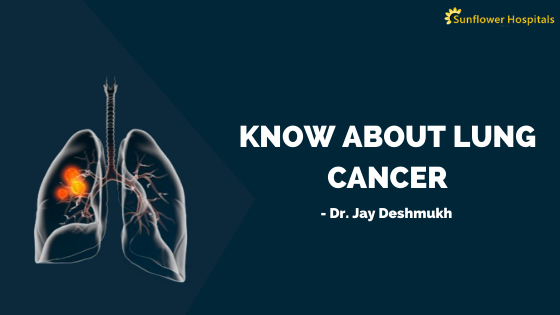What is the most important contributor to lung cancer?
Dr. Jay Deshmukh:- Of course tobacco smoking is the most important contributor to lung cancer. Cigarette smoke contains more than 73 carcinogenic chemicals in it. These carcinogenic chemicals are responsible for lung cancer. Vaping is also responsible for lung cancer. Passive smoking is present in an individual who is either living or working with a smoker. This accounts for many deaths the world over.
What are the other causes of lung cancer?
Dr. Jay Deshmukh:- Some chemicals like aluminum cadmium, nickel.coal, coal tar pitch, coke production. radon gas. asbestos, indoor and outdoor air pollution can all increase the risk of lung cancer. Women who are exposed to indoor coal smoke have almost twice the risk of lung cancer.
What are the symptoms of lung cancer?
Lingering or worsening cough, some blood in sputum, chest pain that worsens when you inhale deeply or on coughing, hoarseness of voice, breathlessness, wheezing, weakness and fatigue, loss of appetite and weight loss. Recurrent chest infection including pneumonia or bronchitis may be observed. As cancer of the lung spread, additional symptoms like lumps in the neck or on the bones severe bone pains particularly in the back, ribs or hips, headache, dizziness or weakness or numbness of hands or feet may occur Jaundice can occur if cancer has spread to the liver
Can lung cancer cause symptoms due to hormone release?
These are known as paraneoplastic syndromes. They can cause various symptoms which at times may antedate the usual symptoms of lung cancer. These include muscle weakness, nausea, vomiting. fluid retention, high blood sugar or high blood pressure, seizures or coma confusion.
How is the diagnosis made?
After a physical examination, your doctor will tell you how to prepare for specific tests. These may include X-rays, CT scans or MRI and PET scans. Sputum examination for cancer cells, bronchoscopy, needle biopsy using image ing techniques is always done.
Who should be managing your disease?
Dr. Jay Deshmukh:- Besides your family doctor or Physician, Thoracic surgeon, medical oncologist and a radiation oncologist are involved. The treatment depends upon the staging of cancer and also if it is small cell carcinoma or non-small cell carcinoma. The options are surgery, chemotherapy, and radiation.
What is the life expectancy after diagnosis of lung cancer?
Dr. Jay Deshmukh:- The outcome is better if treatment is started before cancer spread outside the chest. Generally, the diagnosis is achieved when cancer spread outside the chest. Small cell lung cancer is usually very aggressive. Usually, survival beyond 2 years after diagnosis is difficult. Lung cancer is one of the most common cancers in the world. There are more than 1.8 million deaths every year due to lung cancer. The most common are non-small cell cancer. Smoking or second-hand smoke is linked to 90% of lung cancers. Tobacco products contain more than 7000 chemicals at least 73 are known as carcinogens. Avoiding smoking active or passive form is strongly recommended.

